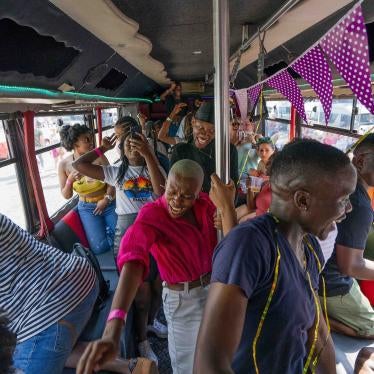(The Hague) - The International Criminal Court's (ICC) joint trial of two Congolese rebel leaders offers victims the chance to see accountability for atrocities committed in Congo's armed conflict, Human Rights Watch said today.
The trial of Germain Katanga and Mathieu Ngudjolo Chui for war crimes and crimes against humanity committed in Ituri district in eastern Congo is scheduled to start on November 24, 2009, in The Hague. Despite substantial cooperation by Congo, another Congolese warlord sought by the ICC, Bosco Ntaganda, remains at large and now plays a leading role in military operations in eastern Congo backed by United Nations peacekeepers.
"With Katanga and Ngudjolo in the dock, victims will finally learn the truth behind the crimes causing their suffering," said Param-Preet Singh, counsel with Human Rights Watch's International Justice Program. "The trial should remind rights abusers in Ituri and elsewhere that they too may face justice one day."
Katanga is the former chief of staff of the Patriotic Force of Resistance in Ituri (FPRI), an ethnic Ngiti-based militia group. Ngudjolo is the former chief of staff of the Front for National Integration (FNI), an ethnic Lendu-based militia allied to Katanga's group. Each man is charged with seven counts of war crimes and three counts of crimes against humanity for using child soldiers, sexual slavery, rape, and murder in an ethnically targeted military operation in early 2003. The goal of the operation was to "wipe out" Hema civilians in the village of Bogoro in the Ituri district of eastern Congo. Lendu and Ngiti-based militias had been battling Hema militias in Ituri since 1999 in an ethnic conflict that spiraled out of control.
Beyond giving testimony as witnesses, some victims will have a distinct role in proceedings under ICC rules. While not parties, victims can participate in the trial by voicing their "views and concerns" where their personal interests are affected, provided it is done in a manner consistent with the rights of an accused and a fair trial. To date, the judges have deemed nearly 350 victims eligible to participate in the Katanga and Ngudjolo trial.
The Ituri conflict and other conflicts in eastern Congo highlight the participation of non-Congolese forces in the violence in that region. Ituri in particular became a battleground involving the governments of Uganda, Rwanda, and Congo. These governments provided political and military support to the ethnic-based militias in Ituri and other Congolese armed groups despite abundant evidence of their widespread violations of international humanitarian law. The ICC prosecutor, Luis Moreno Ocampo, has repeatedly said that he will bring to justice those who bear the greatest responsibility for serious crimes committed in Congo.
"The ICC prosecutor should ensure that justice is done in Ituri by focusing on senior officials in Congo, Rwanda and Uganda who armed and supported the Ituri-based militias," Singh said.
Human Rights Watch said the Katanga and Ngudjolo trial also draws attention to Ntaganda, the remaining Congolese suspect wanted by the ICC. He is accused of enlisting and conscripting children under age 15 and of using them as active participants in hostilities in Ituri between July 2002 and December 2003, when he was military chief of staff of the Union of Congolese Patriots (UPC), a largely Hema-based militia. His co-accused, Thomas Lubanga, is on trial for the same crimes in The Hague. In addition to using child soldiers, Lubanga's group has been involved in ethnic massacres, torture, and rape during the Ituri conflict.
Ntaganda remains in eastern Congo, where he continues to commit serious abuses. In November 2008, he commanded an attack on the town of Kiwanja in North Kivu province where an estimated 150 civilians were killed. In January 2009, Ntaganda was made a general in the Congolese army after his rebel group, the National Congress for the Defense of the People (CNDP), agreed to give up its armed struggle and join the government army.
The Congolese government has been at the forefront of cooperation with the ICC. In 2002, the government of President Joseph Kabila ratified the Rome Statute, which created the ICC, and in April 2004, Congo specifically asked the court to initiate an investigation in Congo. The ICC prosecutor opened the first investigation in June 2004. The government has assisted in the arrest and transfer of Lubanga, Katanga and Ngudjolo. Despite such exemplary cooperation, the government has refused to arrest Ntaganda, claiming such an arrest would weaken the country's fragile peace.
"Allowing alleged war criminals such as Bosco Ntaganda to lead troops only gives a green light to him and others to continue their attacks on civilians," Singh said. "The Congolese government should arrest Ntaganda, as it did the other Ituri warlords."
Representatives of the ICC's 110 states parties are meeting in The Hague this week to discuss the ICC's management and oversight. Human Rights Watch emphasized the importance of ongoing state cooperation and political and financial support for the court so it can effectively carry out its mandate.







